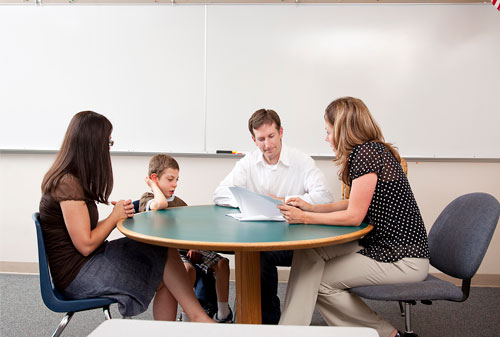




Developing effective relationships allows everybody to work together successfully with the aim of meeting the needs of children and their families/carers. It is important to be polite and to show respect whilst considering other people's feelings. By doing so, workers will gain the trust of others. Workers should be friendly but also professional when dealing with matters concerning children, young people and their families/carers.
Time is needed to communicate effectively with workers, other professionals, carers and families. Workers should:
Good communication gains trust
Attitudes influence people, so it is important to act consistently and to take time to listen to the viewpoints of others. When welcoming families/carers and workers, sufficient time should be allowed, and the process of reporting or giving feedback at the end of the day should not be rushed. That will show them respect, and in turn will result in a good relationship between the home and the care setting. It may be necessary to speak to professionals who are working with the parents/carers of a disabled child or who come from a different cultural background more often.
A friendly and professional attitude will make it easy for parents/carers, staff and professionals to approach the setting. It is important to be professional - consulting with more experienced members of staff or professionals if there is any uncertainty with regard to how much information should be shared with a parent/carer. Being a member of a team makes it easy to ask for help and to act in accordance with that help for the benefit of the children. Attending regular meetings and undertaking appropriate training will contribute to the development of effective relationships. With efficient time-keeping and organisation, workers will conduct themselves in a professional manner.
Good communication gains trust and includes the following elements:
Barriers to developing effective relationships:
Mae datblygu cydberthnasau effeithiol yn caniatáu i bawb weithio gyda’i gilydd yn llwyddiannus gyda’r nod o ddiwallu anghenion plant a’u teuluoedd/gofalwyr. Mae’n bwysig bod yn gwrtais a dangos parch gan ystyried teimladau eraill. Yn sgil hyn, bydd gweithwyr yn ennyn ymddiriedaeth eraill. Mae angen bod yn gyfeillgar ond hefyd yn broffesiynol wrth ddelio gyda materion sy’n ymdrin â phlant, pobl ifanc a’u teuluoedd/gofalwyr.
Mae angen amser i gyfathrebu'n effeithiol â'r gweithwyr, gweithwyr proffesiynol eraill, gofalwyr a theuluoedd. Mae angen:
Mae cyfathrebu da yn ennyn ymddiriedaeth
Mae agweddau'n dylanwadu ar bobl, felly, mae'n bwysig bod yn gyson a chymryd amser i wrando ar safbwyntiau eraill. Mae angen sicrhau rhoi amser i deuluoedd/gofalwyr a gweithwyr wrth eu cyfarch yn groesawgar, a pheidio â rhuthro i roi adroddiad neu adborth iddynt ar ddiwedd y dydd. Bydd hynny'n dangos parch atynt a bydd hynny’n arwain at berthynas dda rhwng y cartref a'r lleoliad gofal. Efallai y bydd angen siarad yn amlach gyda gweithwyr proffesiynol sy’n cydweithio â rhiant/gofalwr plentyn anabl neu sy'n dod o gefndir diwylliannol gwahanol. Bydd agwedd gyfeillgar a phroffesiynol yn ei gwneud yn hawdd i rieni/gofalwyr, staff a gweithwyr proffesiynol ymwneud â’r lleoliad. Rhaid bod yn broffesiynol - gan ymgynghori ag aelodau mwy profiadol o’r staff neu weithiwr proffesiynol arall os nad oes sicrwydd ynghylch faint o wybodaeth y dylid ei rannu gyda rhiant/gofalwr. Mae bod yn aelod o dîm yn ei gwneud yn hawdd gofyn am gymorth a gweithredu ar y cymorth hwnnw er budd y plant. Bydd mynychu cyfarfodydd yn rheolaidd ac ymgymryd â hyfforddiant priodol yn cyfrannu at feithrin cydberthnasau effeithiol. Wrth gadw at amser a bod yn drefnus, bydd gweithwyr yn ymddwyn yn broffesiynol.
Mae cyfathrebu da yn meithrin ymddiriedaeth ac yn cynnwys yr elfennau isod.
Rhwystrau wrth feithrin cydberthnasau effeithiol:
Drag the statements over to the correct column
Llusgwch y datganiadau i’r golofn gywir